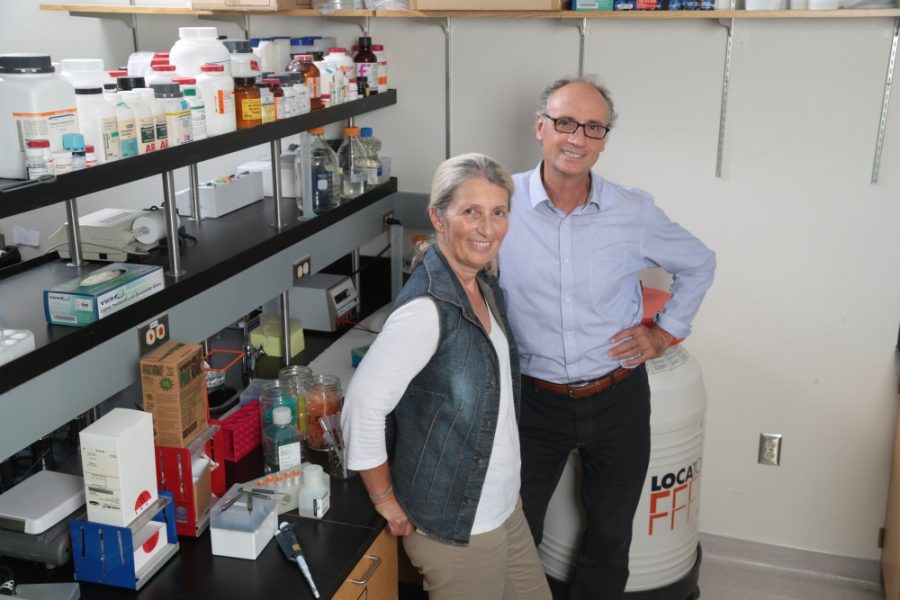Researchers from the University of Arizona Cancer Center are studying the impact soy has on breast cancer.
Ornella Selmin and Donato Romagnolo are professors of nutritional sciences at the UA’s Cancer Center. It’s their job to look into dietary factors that may affect the prevalence of certain types of cancer in the human body.
“There is some controversy about whether or not soy intake, or supplementation, is beneficial as a preventative for breast cancer,” Romagnolo said. “Soy intake appears to be protective in Asian populations, but typically that is a lifetime exposure from foods and not supplements.”
According to an article by Nutrition.org, breast cancer rates in Asia are six times lower than the rest of the world. It appears that soy intake has a big part in that result — but there’s a catch. The article said that consuming soy compounds from birth — either directly or indirectly through breast milk — can cut risk for breast cancer in half, but consuming soy later in life will only reduce the risk by 25 percent.
Over 40 thousand people die of breast cancer every year, according to cancer.net. To give some perspective, less than 60 thousand Americans died in the Vietnam war, which lasted roughly 20 years. It’s estimated that over 250 thousand American women will be diagnosed with invasive breast cancer this year alone.
“People may think ‘I can supplement my diet with soy extract or soy compounds’ [but] you go from diet inefficient to pharmacology,” Romagnolo said. “That is where the confusion comes in.”
RELATED: Intergalactic Probiotics
Because there is still some uncertainty as to what exact compound has these benefits and how long a person needs to be exposed, supplements like extracts or concentrates may leave out certain parts of the bean that might hold the answer.
The UA research team is exploring the possibility that soy intake may help in the expression of the BRCA1 gene, which plays a role in breast cancer. The gene is usually a tumor suppressor, but it can mutate, leading to cancer cells dividing with less restriction. However, this mutation is not highly common.
“BRAC1 mutation carriers represent only a small percentage of breast cancer cases, maybe five or ten percent,” Romagnolo said. “The remaining 90 percent develop breast cancer without any mutations.”
Romagnolo recalled reading about actress Angelina Jolie, who in 2013 opted into a double mastectomy. This was a precautionary measure, recommended by her doctors when they discovered that Jolie was a carrier of the BRCA1 mutant gene. Carrying this genotype puts a woman at a 55-65 percent likelihood of getting breast cancer.
“We have found over the years that the [BRAC1] gene is a target for a nuclear receptor, called AHR, which is activated by a number of environmental and dietary compounds,” Romagnolo said. “For example, UV exposure, metabolites of fatty acids, exposure to environmental compounds found in industrial and tobacco smoke [activate it].”
RELATED: UA College of Medicine: Saving lives since 1967
The AHR, or aryl hydrocarbon receptor, channels these carcinogens, which limits the natural cancer-fighting properties of the BRCA1 gene.
“We made a link between the activity and expression of AHR with loss [of] BRAC1,” Romagnolo said. “Certain types of breast cancer over-express this receptor.”
There are three receptors that can can be targeted by doctors in a patient’s treatment: estrogen receptors, progesterone receptors and the human epidermal growth factor receptor 2. When a cancer patient does not express those three, then their cancer is referred to as triple negative breast cancer.
Romagnolo said that patients with this type of cancer can only be treated with chemotherapy as a last hope.
“They’re giving women compounds trying to kill cancer cells hoping that the normal cells will survive,” Romagnolo said. “It’s almost a suicidal mission.”
Romagnolo and Selmin are looking into different types of cancers like triple negative, to see how they are affected by soy compounds.
“Ultimately, we want to find out if we can isolate some of the biochemical mechanisms involved in the protective effects of soy compounds,” Romagnolo said.
This research could lead to better cancer treatments, or more options for prevention.
Follow Chandler Donald on Twitter









